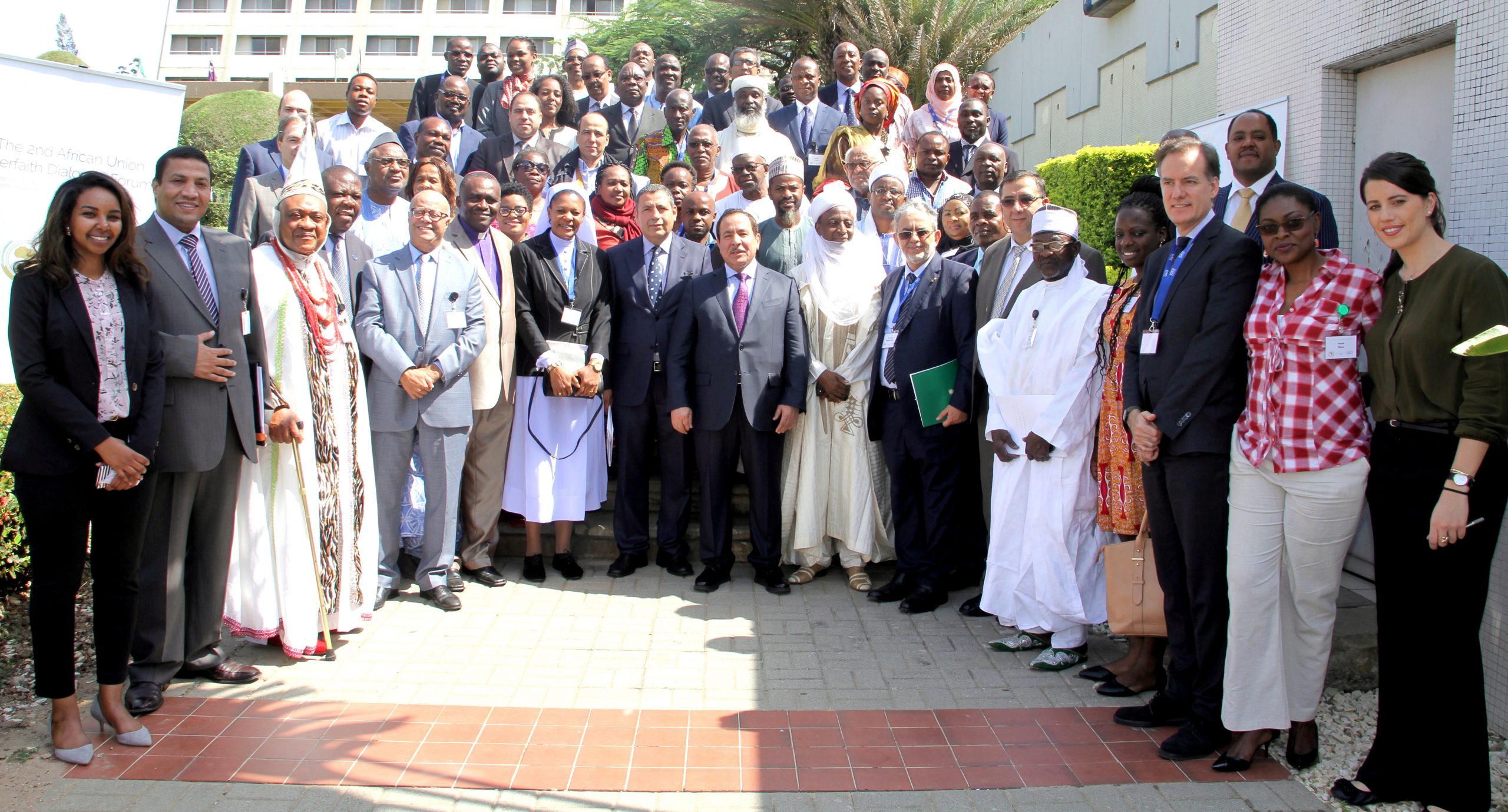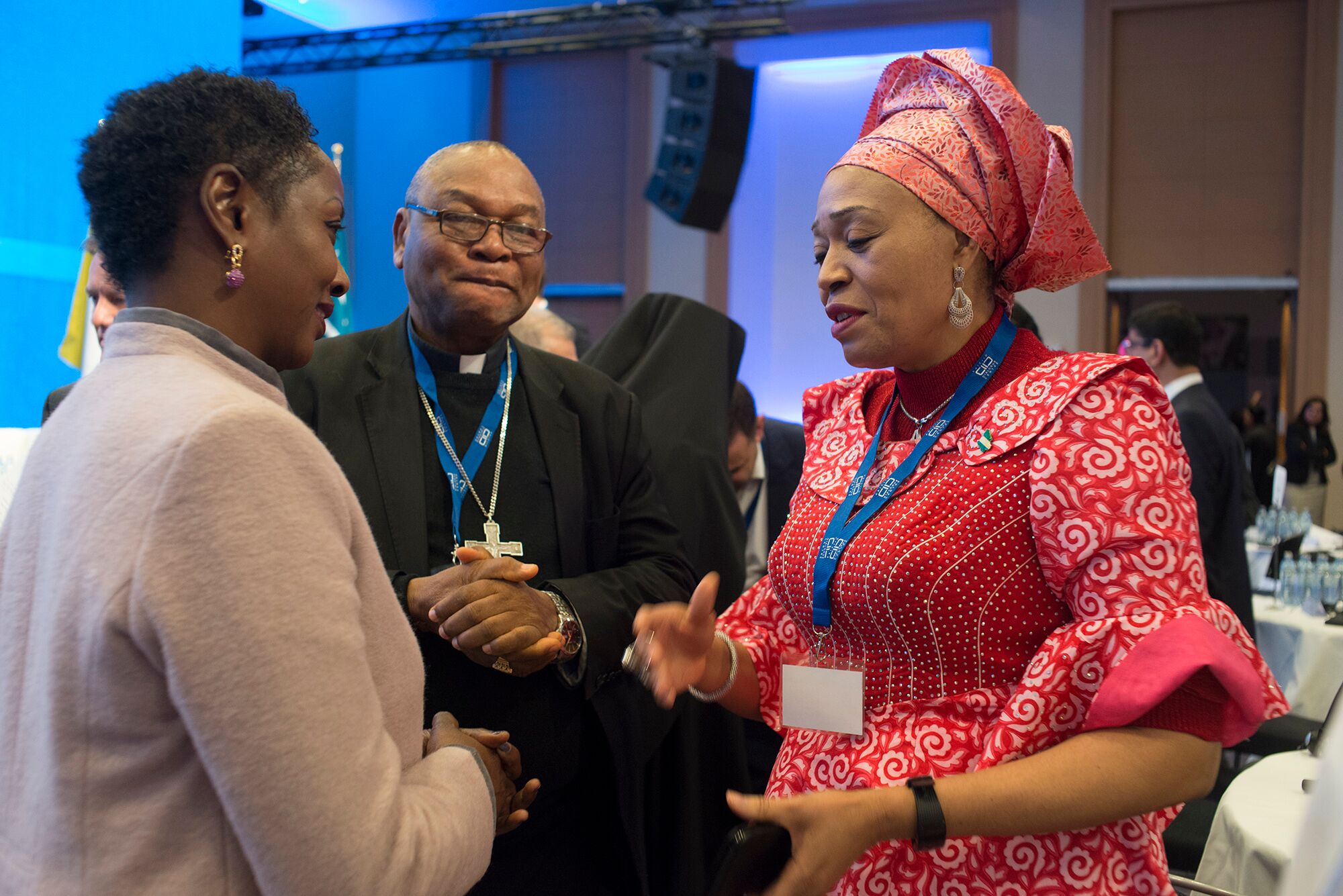The Second AU-Interfaith Dialogue Forum Declaration

THE 2ND AU-INTERFAITH DIALOGUE FORUM DECLARATION
Following two days of deep reflections, deliberations, sharing of experiences and discussions on the way forward on the theme of the conference and;
We, the participants of the forum “Leap of Faith: Religious Leaders Advance Justice, Peace, Security, Dialogue and Development in Africa” held in Abuja, Nigeria on November 10-11, 2016, jointly organized by AUC and KAICIID Dialogue Centre;
EXPRESS our gratitude for the Government and people of Nigeria for the hosting of the Forum;
EXTEND our appreciation to KAICIID Dialogue Centre for the substantial support and partnership in re-activating the forum, and its long-term engagement with this initiative;
WELCOME AND ENDORSE the initiative of the African Union Interfaith Dialogue Forum;
ACKNOWLEDGE the utmost effort of the Citizens and Diaspora Directorate (CIDO) in pioneering, mainstreaming, and facilitating interfaith dialogue and interreligious programmes within the African Union;
TAKE INTO ACCOUNT that peaceful co-existence and harmony among different religions and cultures can be significantly enhanced by promoting inter-religious, inter-cultural and inter-civilization constructive dialogue, education and cooperation;
RECOGNIZE the role of interfaith and faith-based organizations as well as religious and traditional leaders in promoting inter- and intra religious dialogue for peaceful co-existence, harmony, peacebuilding and development in Africa;
RECALL the recommendations of the AU consultative meeting on Agenda 2063 for faith-based organizations in Africa, as well as the African common position on post 2015 that expresses the aspirations of the African people;
CONSCIOUS of the need to build a structured partnership between African Union and interfaith and faith-based organizations as well as religious and traditional leaders for popularizing and implementing Agenda 2063 and SDGs in Africa;
AFFIRM that the life, dignity, rights and wellbeing of each person should be at the centre of all our work;
CONCERNED by the misuse of Religion which is often instrumentalized by radical groups to serve their own interests and perpetuate violence;
MINDFUL that poverty and inequality grimly violate human dignity, wellbeing and have grave moral and spiritual dimensions;
CONVINCED that all religions are based on tolerance and peace;
AWARE that religion should not be used as a platform to incite hate, conflict, violence, war or terrorism;
CONSCIOUS of the importance of interfaith and faith-based organizations and religious leaders in fostering a culture of peace and preventing violent extremism in Africa;
COGNIZANT of the need to actively involve faith-based organizations in the effort of ending poverty in all its forms and to achieve an integrated, prosperous, stable and peaceful Africa, as stated in Agenda 2063;
EMPHASIZE the need to enhance the working partnership among interfaith and faith-based organizations as well as religious and traditional leaders with policy makers in the member states of the African Union so as to promote harmony, peace and the dignity of all individuals as enshrined in the Universal Declaration of Human Rights;
RECOGNIZE the common and shared value of all religions and faith traditions like the teaching of the Golden Rule which says “Treat others the way you want to be treated” as affirmed in many religions, traditions, indigenous cultures, and secular philosophies as a fundamental principle of life and the foundation on which morals, values and ethics are founded;
CONVINCED that peace is possible when we utilize the shared values of religion to make peace within ourselves, our families and in our respective communities;
We hereby commit to the following Plan of Action:
Steering Committee
- Elect a Steering Committee comprising of 12 members, representing the different regions, religions, including African Traditional Religions with high integrity, credibility, sound experience on interfaith issues and good reputation;
- Ensure that each of the five regions is represented by two members, taking into consideration gender, faith, and ethnic representation;
- Define and adopt Terms of Reference clarifying the Steering Committee’s responsibilities and tasks;
- Coordinate effectively its working partnership with African Union,the Regional Economic Communities (RECs) and other peacebuilding organizations.
Media and Advocacy
- Create a platform for communication and media in Africa comprising of all stakeholders, such as religious leaders, civil society, ministries dealing with religious issues
- Call for a code of conduct of journalists reporting on religious issues;
- Provide training for journalists covering religious issues;
- Encourage different media in Africa to promote and highlight interreligious and intercultural dialogue and good practices in our respective countries;
- Engage in advocacy, coordination and social accountability and mobilize spiritual support for vulnerable people and communities, including the internally displaced and refugees;
- Create engagement strategies directed specifically to family, children, youth and women;
- Take concrete steps to address hate speech and to counter hate, bullying and discrimination through positive speech, tolerance and constructive dialogue in Africa;
- The Steering Committee should facilitate and support the training of Religious leaders in media and advocacy.
Partnerships
- Foster partnership among interfaith and faith-based organizations as well as religious and traditional leaders in Africa to work together with African Union, its member countries, and Regional Economic Communities (RECs), and other stakeholders to promote a culture of peace and inter-religious and inter-cultural constructive dialogue;
- Call on intergovernmental and international organizations to consult religious organizations in Africa in cases where they are crucial in promoting people`s ownership of their own development;
- Take concrete and collective practical action to bring positive change in Africa which leads us from war to peace, from killing each other to co-existence, from disrespect to honoring each other, from hate to love, from despair to hope, from being selfish to living for the sake of others and from revenge to forgiveness and reconciliation.
Development; Agenda 2063 and SDGs
- African Union to support the Steering Committee to establish a 10 year interfaith development agenda for all African Union member states based on Agenda 2063 and Agenda 2030 and five years strategic plan;
- Create an evaluation strategy for the Steering Committee.
- Strengthen community resilience through advocacy and awareness raising of particularly vulnerable groups.
- Raise awareness on human trafficking and migration among communities.
Education
- Promote a culture of peace and reconciliation through the teachings of the different holy books in Churches, Mosques, Synagogues, Temples and all Worship places;
- Introduce peace education as part of the school curriculum, university programmes and theological institutions to promote understanding, tolerance and friendship among human beings in all their diversity of religion, belief, culture and language.
- Implement the outcomes of the ‘peace education through interreligious and intercultural dialogue’ initiated by the Government of Benin and endorsed by the African union;
- Share success stories and good practices of peaceful coexistence among different religions and cultures in Africa;
- Promote peace education in refugee camps;
- Peace building
- Review the postcolonial state-religion model;
- Promote good governance and resource governance;
- Establish monitoring mechanisms to ensure equitable resource distribution;
- Advocate for silencing the guns and ATT.
Preventing Violent Extremism
- Create a platform that encourages the soft power of religion in preventing violent extremism, instrumentalization of religion and religiously motivated violence;
- Call on religious leaders to provide a practical example in their common rejection of violence and to stand for the defense of values of diversity and respect for life and the dignity of human rights.
- The Steering Committee should facilitate and support the training of religious leaders in conflict resolution.
Women and Gender
- Ensure equal and active participation of women in the Steering Committee and interfaith organization and as implementers;
- Emphasize the role that women and youth can play in the processes of building peace by supporting leadership development for women and youth religious leaders;
- Empower women to actively participate in decision making processes across the society;
- Emphasize the role of religious leaders in preventing all forms of Gender based Violence, such as economic, sexual and physical and ending child marriage;
- Ensure the promotion of girl and women education;
- Build capacity of religious leaders in gender issues and sensitivities;
- Religious leaders should prepare newly married couples for their future life together;
Youth and Vulnerable Groups
- Create a platform for youth and religious leaders;
- Advocate for equal youth opportunities such as participation and youth employment;
- Steering Committee to consider the plied of children in peace security, safety and sustainable development;
- Advocate for drug-free schooling and communities;
MAY PEACE PREVAIL ON EARTH
Done on November 11, 2016 in Abuja, Nigeria
The 2nd AU-Interfaith Dialogue Forum Declaration
Back
